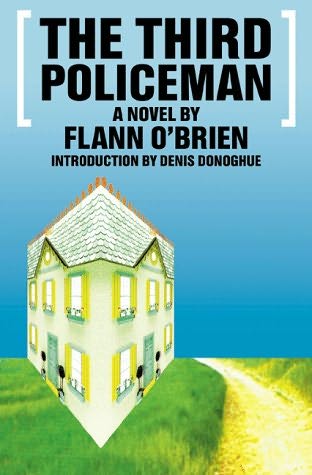Wellll... O.K., it's only a coincidence that I'm writing this two days before St. Patrick's Day. The real reason I selected this book is that I'm a big LOST nerd and a few years back one of the writers (Craig Wright) remarked, after the book was seen in Desmond's bunk in The Hatch, that the book "was selected for a reason" and contained key insights into the show.
There were some interesting echoes between the two, but the primary possible connection (which I will discuss in a moment) seems to already have been discounted by LOST honchos Lindelof and Cuse.
*THE THIRD POLICEMAN SPOILERS AHEAD*
I'm not a big fan of spoilers, but in this case I feel I can't avoid talking about them. The reason? The Introduction to The Third Policeman gave away the twist ending.
The Introduction!
p.vii (taken from a 1940 letter from O'Brien to William Saroyan):
When you get to the end of this book you realize my hero or main character (he's a heel and a killer) has been dead throughout the book and that all the queer ghastly things which have been happening to him are happening in a sort of hell which he has earned for the killing.
How can it be OK to divulge this kind of information in the Introduction, especially for a book that isn't widely known and therefore not something that everyone pretty much has heard of before à la what happens at the end of Romeo and Juliet or Of Mice and Men? Or maybe the better question is, are we not supposed to read the Introduction until after we've read the book proper? I'm at a loss here- anyone knowing the proper reading and writing etiquette please chime in.
Since the folks at LOST have repeatedly denied that the scenario we've been watching for four seasons now is a representation of limbo or the afterlife, the "big" connection doesn't resonate. That said, there are some interesting minor connections in the dog-ears to follow.
One more (proper?) nugget from the Intro before we smooth back the dog-ears. This bit of information completely endeared me to the author before ever reading a line of his work:
He could not face the humiliation of telling Dublin that his second novel had been rejected in two continents, so he took a desperate step. He pretended that the sole typescript of the novel had been lost and that he could not write it again. Donagh MacDonagh was the only friend to whom he confided the truth. The book was not published till 1967, a year after O'Brien's death.
O'Brien wrote what is now considered a minor masterpiece in 1939-40, but he lived with feelings of deception and shame about it until his death twenty seven years later... when it was promptly published to great acclaim!
Life's a bitch and then you die and then you get published.
With no further ado, here are my selections from this most unusual, Seussian, frustrating, Escherian, frightening, Carrollian, bicycle- and pancake-obsessed and realistically surrealist novel:
p21 "The softening and degeneration of the human race he* attributes to its progressive predilection for interiors and waning interest in the art of going out and staying there. This in turn he sees as the result of the rise of such pursuits as reading, chess-playing, drinking, marriage and the like, few of which can be conducted in the open."
* the "he" in question is the deep-in-left-field (and fictional) philosopher de Selby, who the unnamed narrator is obsessed with, committing murder to bankroll his pursuit of writing a definitive commentary on de Selby's life. It says a bit about the narrator that some of de Selby's core beliefs are that the world is not round, but "sausage-shaped," and that the dark of night is brought on by an accumulation of "dark air" from "a staining of the atmosphere due to volcanic eruptions too fine to be see." This may also be a good time to point out that the author O'Brien is described as "a natural alcoholic" and writes as though he were crazy in the coconut.
p24 "In the darkest corner of the room near the window a man* was sitting in a chair, eying me with a mild but unwavering interest."
* the description of this man Mathers is eerily reminiscent of LOST's favorite apparition Jacob.
p44 (the one-legged narrator discusses the value of life with the one-legged thief Finnucane):
Is it life? Many a man has spent a hundred years trying to get the dimensions of it and when he understands it at last and entertains the certain pattern of it in his head, by the hokey he takes to his bed and dies! He dies like a poisoned sheepdog.
p47 desideratum | diˌsidəˈrätəm; -ˈrātəm; -ˌzidə-|
noun ( pl. -ta |-tə|)
something that is needed or wanted : integrity was a desideratum.
ORIGIN mid 17th cent.: from Latin, ‘something desired,’ neuter past participle of desiderare (see desiderate ).
p48 factivity/factive |ˈfaktiv|
adjective Linguistics
denoting a verb that assigns the status of an established fact to its object (normally a clausal object), e.g., know, regret, resent.
p50 "Of all the many striking statements made by de Selby, I do not think any of them can rival his assertion that 'a journey is an hallucination'."
p59 "'The first beginnings of wisdom,' he said, 'is to ask questions but never to answer any. You get wisdom from asking and I from not answering.'"
p66 sempiternal |ˌsempəˈtərnl|
adjective
eternal and unchanging; everlasting : his writings have the sempiternal youth of poetry.
DERIVATIVES
sempiternally |ˈˈsɛmpəˈtərnli| adverb
sempiternity |-ˈtərnitē| |ˈsɛmpəˈtərnədi| noun
ORIGIN late Middle English : from Old French sempiternel or late Latin sempiternalis, from Latin sempiternus, from semper ‘always’ + aeternus ‘eternal.’
p72 "It was so faultless and delightful that it reminded me forcibly, strange and foolish as it may seem, of something I did not understand and had never even heard of."
p75 acatalectic |āˌkatlˈektik| Prosody
adjective
(of a line of verse) having the full number of syllables.
noun
a line of verse of such a type.
p83 banjaxed/banjax |ˈbanˌjaks|*
verb [ trans. ] Brit., informal
ruin; incapacitate : he said the scheme was banjaxing the tourist industry.
ORIGIN 1930s: originally Anglo-Irish, of unknown origin.
*"banjax" is offically my new favorite word. Please, don't make me banjax you.
p 105 pari passu |ˌpärē ˈpäˌsoō|
adverb
side by side; at the same rate or on an equal footing : early opera developed pari passu with solo song.
ORIGIN Latin, literally ‘with equal step.’
nolle prosequi |ˌnälē ˈpräsiˌkwē|
noun Law
a formal notice of abandonment by a plaintiff or prosecutor of all or part of a suit or action.
• the entry of this in a court record.
ORIGIN late 17th cent.: Latin, literally ‘be unwilling to pursue.’
p123
'And he lay looking at the map for five years more before he saw that it showed the way to eternity.'
'To eternity?'
'Certainly.'
'Will it be possible for us to come back from there?' I whispered.
'Of course. There is a lift.'
p133
'How big is all this place?'
'It has no size at all,' the Sergeant explained, 'because there is no difference anywhere in it and we have no conception of its unchanging coequality.'
p138 "'But the secret of it all-in-all,' continued the Sergeant, 'is the daily readings*. Attend to your daily readings and your conscience will be as clear as a clean shirt on Sunday morning. I am a great believer in the daily readings.'"
*do you get the sense that Locke was a big fan of the "daily readings" before he screwed the pooch at the end of Season Two?
p158 "'Strange enlightenments are vouchsafed," I murmured, 'to those who seek the higher places.'"












